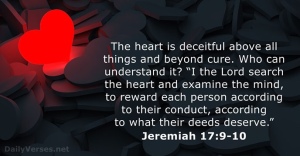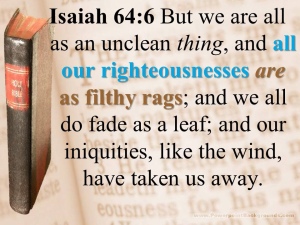The Different Names of God | Jehovah Tsidkenu
Jehovah Tsidkenu means The Lord Our Righteousness.
Righteousness means to be morally right or justifiable.
We’ve been born into a fallen world. It’s natural for us to sin and enjoy sin. This is the reason our flesh fights the spirit whenever we want to please God. Watch a growing child carefully and you will observe that despite the cuteness of what that child does, he/she naturally will not want to share toys or apologize. This is because the sinful nature of this world is part of the child. This is also why the parent or guidance comes in to teach that child how to share, apologize and be nice. No one is naturally sinless. We all have the tendency to do even the very evil thing we think we can never do. We just need to be triggered in that direction. That is the reason why the Bible says the heart of man (including yours and mine) is desperately wicked.

No matter how nice we are, our thoughts are not always pure. Jesus Christ had to do the needful – to die for our sins and to serve as an advocate for us. So when God sees us, He doesn’t only see us, He also sees Jesus Christ who shed His blood for our sins. This is why He shows us mercy. Oftentimes I hear people say you don’t need to accept Jesus to go to heaven. They try to justify this by naming well-known people who are philanthropists or a very good neighbor who happens to be the kindest person they have ever met but who doesn’t like being told about Jesus Christ.
It’s good to do good works. The Holy Spirit enables us to do good works. If we are to live like Christ, we have to go about doing good just like He did when He was on earth. However, we need to know that all our righteousnesses put together is like a filthy rag before God.

Our good works can’t cut it! Being a very good guy/girl who is morally right alone won’t take us to heaven. We all need Jesus Christ. He exchanged His righteousness for our sins on the cross of Calvary so we can be justified before God.
A good way to picture it is like us wearing clothes. No matter how much we clean ourselves, moisturize and look after our skin, we are naked until we are clothed. When we see a naked person walking around, even if they smell good and look clean, we still won’t want to associate with them willingly. We won’t accept that they are normal. Peradventure it happens to be true that that person is normal, there will be a level of shame that the individual will feel.
The bath, moisturizers and deodorants we wear are our works. No matter how good our works smell and look, they are still shameful in the sight of God. The smell comes as a bad smell that cannot please Him. The cloth we put on is Jesus Christ. We put on Jesus Christ when we accept Him into our lives. Just as we are seen differently with clothes on, God sees us differently when we have Jesus in our lives. Our works becomes acceptable because they are done in Jesus.
God brings us back to Himself and reconciles us by blotting our sins and making us right with Him (2 Corinthians 5:18). God saw that our mere works still won’t qualify us to spend eternity with Him. Heaven, where God stays, is sinless and for us to be able to stay with Him forever, He needed to ensure that we were fit for where we are going to.
Isaiah was a prophet who was a good guy and was doing really well. However in Isaiah 6:5, he saw that he was not worthy to be in the presence of God when he had an encounter because his eyes were opened to how righteous God is.

Christianity isn’t based on our works. It is based on the finished work Jesus Christ did on the cross. Please don’t interpret this wrongly. We are to do good and we should do good! But it’s important for us to understand that our good works alone will not make us spend eternity with God.
I thank Jehovah Tsidkenu, whose righteousness we wear and who has made us worthy heirs of the kingdom.
–Efua Uke is a United Kingdom-based mentor, blogger, and contributor to Ambo TV. This article originally appeared on her website Grace Over Pain.
